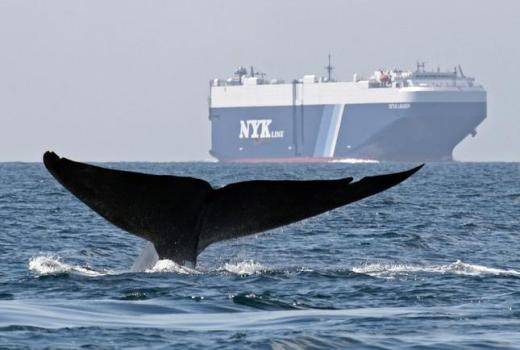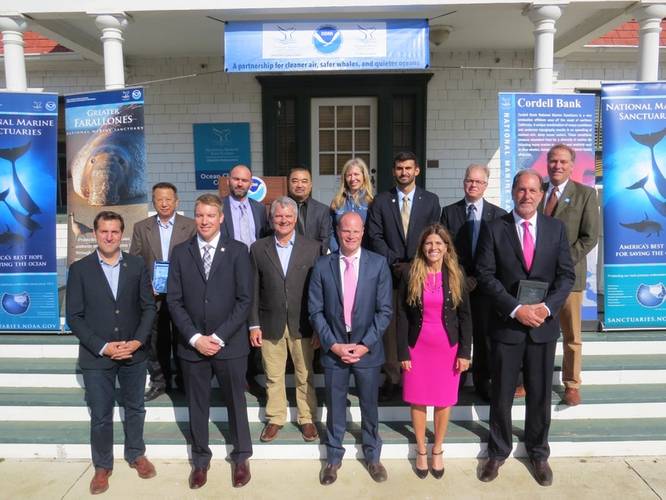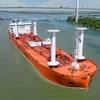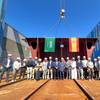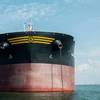Shipping Companies Recognized for Efforts to Save Whales
NOAA presented awards to 13 global shipping firms for their commitment in helping prevent ship collisions with whales off the coast of California.
The companies participated in a Voluntary Speed Reduction initiative by slowing their ships to speeds of 10 knots (about 11.5 mph) or lower while transiting vessel traffic lanes outside the Golden Gate during whale feeding season, from May through mid-November.
The national marine sanctuaries of North-central California - Greater Farallones, Cordell Bank and Monterey Bay sanctuaries - are prime foraging grounds for several endangered whale species, and through these same waters pass some of the heaviest shipping traffic in the world. In a spirit of “share the road,” the voluntary slowdown initiative is a collaboration between NOAA’s Office of National Marine Sanctuaries, the shipping firms, the Bay Area Air Quality Control District and local NGOs.
The initiative program builds on decades of research by scientists and conservation groups who study the whales’ distribution patterns during their spring-through-fall foraging seasons along with vessel traffic patterns. It is modeled on similar efforts in Southern California and on the East Coast. In addition to providing whale protection benefits such as a reduction in risk of ship strike and a reduction in ocean noise, ships run more efficiently at slower speeds, which results in reduced greenhouse gas and particulate emissions and improves air quality for Bay Area residents.
This spring, five whales that had been killed by ship strike washed up on Bay Area beaches; three of these were endangered blue and fin whales. Several species are still recovering from whaling impacts, which had decimated most populations. But their recovery is not absolutely assured, since new threats have emerged in the meantime, primarily human-related.
“With strong legal protections, and conservation-directed actions to protect whales, these populations stand a better chance of becoming healthy once again,” said Dan Howard, superintendent of Cordell Bank National Marine Sanctuary. “It will take an ongoing effort involving strong, creative partnerships to achieve fewer lethal whale strikes, while improving air quality, and ensuring the efficient flow of commerce to and from our nation's ports.”
NOAA’s marine sanctuaries acknowledged the following shipping companies for their participation in the 2017 vessel speed reduction program: Mediterranean Shipping Company; Yang Ming Marine Transport Corp.; Polar Tankers Inc.; Celebrity Cruises Inc.; Hamburg Sud; ExxonMobil Corp.; Evergreen Marine Corp.; CSL Americas; Mitsui OSK Lines Ltd.; Kawasaki Kisen Kaisha Ltd.; OSG Ship Management Inc.; Tesoro Far East Maritime Company.; Chevron Shipping Company LLC.
Awards were presented by William Douros, Western Regional Director of the Office of the National Marine Sanctuaries; Greater Farallones Superintendent Maria Brown; and Dan Howard from Cordell Bank National Marine Sanctuary.
NOAA’s Cordell Bank National Marine Sanctuary, which lies entirely offshore, off the Marin/Sonoma Coast, was established in 1989. Established in 1981, Greater Farallones waters now extend from off Half Moon Bay north of Pt. Arena. Greater Farallones also manages the northern area of the Monterey Bay sanctuary, from Pt. Año Nuevo north to the Bay Area. Sanctuary waters protect significant natural and cultural resources off the North-central California coast, including various habitats and wildlife, including 36 species of marine mammals, such as whales, dolphins and porpoises; white sharks, the largest breeding seabird rookery in the Lower 48 States, and valuable fisheries. The sanctuary also protects several hundred shipwrecks.





